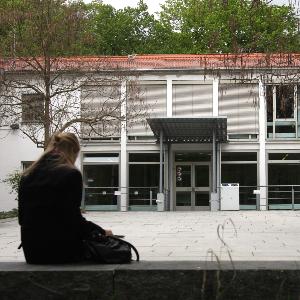A legacy for the scientific community
15 Nov 2022
The Heinz and Sibylle Laufer Foundation was set up after the death of Munich Professor Heinz Laufer. It supports students and researchers in the field of political science.
15 Nov 2022
The Heinz and Sibylle Laufer Foundation was set up after the death of Munich Professor Heinz Laufer. It supports students and researchers in the field of political science.

The foundation promotes students who study political sciences. | © picture-alliance / Sueddeutsche Zeitung Photo | Haas, Robert
From 1969 onward, Munich lawyer and political scientist Heinz Laufer served as Professor of Political Science and Public Law at LMU, as a member of the Board of Directors of the Geschwister Scholl Institute for Political Science, and as Dean of the Faculty of Social Sciences. Before passing away in 1996, he made provision in his will for the establishment of a trust foundation at LMU to promote political science in the study of statecraft. The foundation was to be named after him and his wife Sibylle and was to be attached to LMU (see Stiftungen@LMU, the web page for all LMU foundations).
“It was important to Heinz Laufer that his foundation should specifically promote political science in the study of statecraft,” says Professor Klaus H. Goetz, Chair of Political Systems and European Integration at LMU’s Geschwister Scholl Institute for Political Science, Dean of the Faculty of Social Sciences and Chairman of the Foundation.
“In setting up his foundation, Laufer wanted to play a part in promoting scientific insights on topics such as political systems, state organization and research into the activities of government – public policy, in other words.”
Originally, the foundation’s funds were used primarily to award doctoral scholarships, research contracts and subsidies for printing expenses. Yet the requirements have changed in the meantime: “The funding landscape for doctoral research today, for example, is completely different to what it was in the mid-1990s when the foundation was first established,” Goetz points out. Nowadays, it focuses more on starting, bridging and completion scholarships as ways to fund doctoral researchers. One example was a doctoral candidate from Hong Kong, who received funding for six months after arriving in Germany before being awarded a full German Academic Exchange Service (DAAD) scholarship. In addition, the foundation continues to fund political science research projects – such as a project to analyze voting behavior at the regional government elections in Bavaria – in which students are also involved.
For us, it is important that our activities not only drive research forward, but that they also directly benefit those who study political science at LMU.Klaus H. Goetz
“For us, it is important that our activities not only drive research forward, but that they also directly benefit those who study political science at LMU,” Goetz explains. Since 2017, the Laufer Lectures have been one of the foundation’s most prominent promotional tools, inviting high-caliber international academics to lecture at LMU.
“The Laufer Lectures are embedded in lecture series that provide an introduction to Germany’s political system and to comparative political science,” the Chairman of the Foundation continues. Each speaker engages with one aspect of their current research. “The funds of the foundation make it possible for us to expose students to internationally renowned researchers with whom they are already familiar from the literature. The speakers enjoy these occasions, too, and always address a full auditorium.”
A number of years ago, the decision was also taken to start using the Heinz and Sibylle Laufer Foundation to fund recipients of Deutschlandstipendien (Germany Scholarships). The foundation pays for two scholarships per year and is also involved in the selection process. “The money thus goes to outstanding students of political science at the Geschwister Scholl Institute,” says Goetz. “This practice has proven its worth. With the funds at our disposal, we can make a useful contribution as part of the University-wide network. For their part, the students are very happy to receive what is often crucial assistance.” A scholarship awards ceremony gives the foundation greater visibility within the University.
In addition, the foundation supports awards such as the prizes under the aegis of the Bavarian High School Graduation Prize for Politics and Society, which is backed by the Bavarian chapter of Deutsche Vereinigung für Politische Bildung e.V., DVPB (the German Association for Political Education). In this way, the foundation can attract the attention of potential academic talents to the Geschwister Scholl Institute from an early age.
Klaus H. Goetz is glad that, in accordance with the conditions laid down by the founder, the foundation’s assets can again and again be deployed in such a way that – irrespective of the amounts involved – they yield genuine benefits for both students and researchers in the field of political science. “We are obviously grateful for all the support we can get,” the Chairman stresses. “For us, it is very gratifying to see what a difference even a small contribution can make” – for example via the online donations platform.
Klaus H. Goetz freut sich, dass es immer wieder gelingt, die Stiftungsmittel im Einklang mit der Satzung und im Sinne des Stifters so einzusetzen, dass – unabhängig von der Höhe der Zuwendungen – ein Gewinn für Studierende und Forschende auf dem Gebiet der Politikwissenschaften als Staatswissenschaften entsteht. „Wir sind natürlich für jede Unterstützung dankbar“, sagt der Stiftungsvorstand. „Für uns ist es sehr befriedigend zu sehen, welchen Unterschied schon eine kleine Zuwendung machen kann.“
Heinz and Sibylle Laufer Foundation (in German only)
Direct online donations (in German only)
Deutschlandstipendium (Germany Scholarship)
LMU foundations:
An enduring bond
Supporting female researchers:
The Princess Therese of Bavaria Foundation